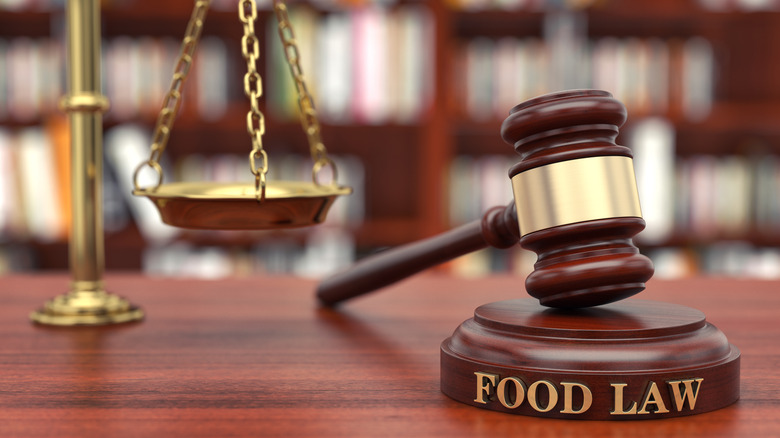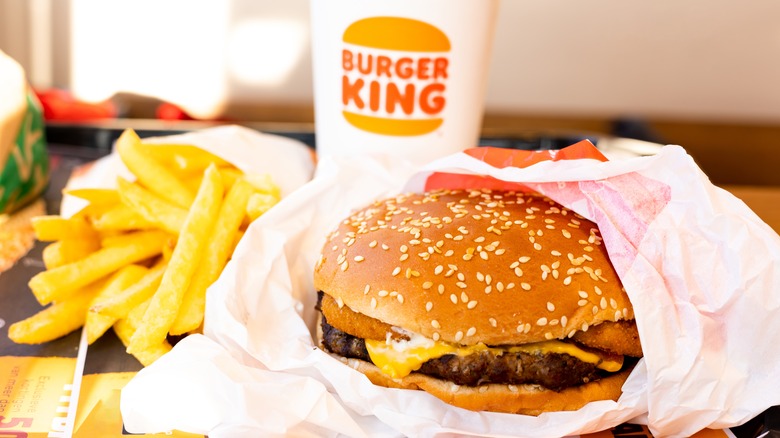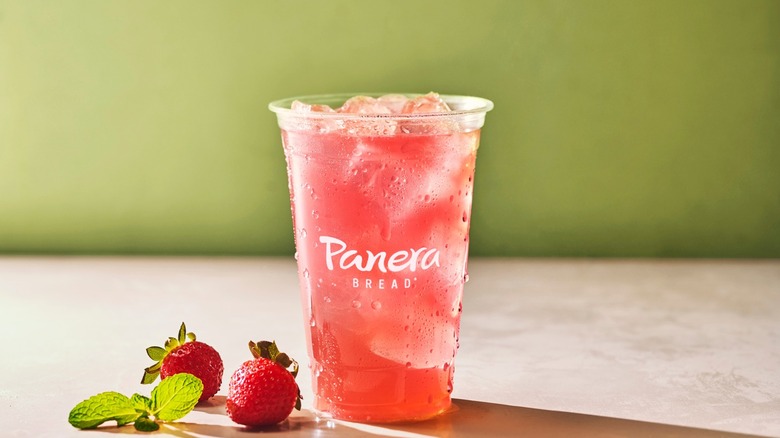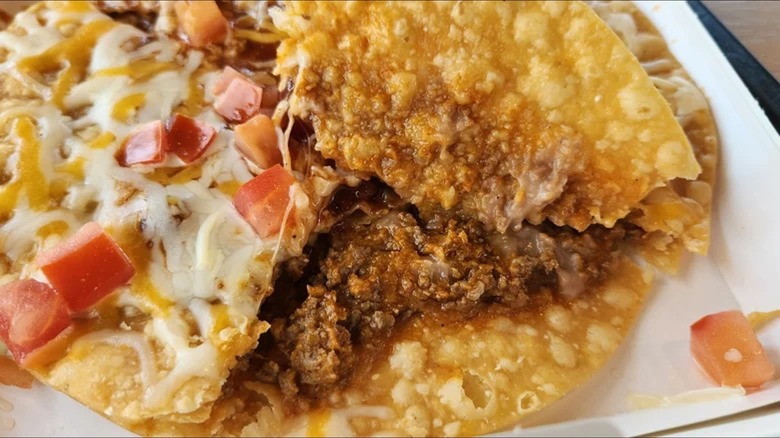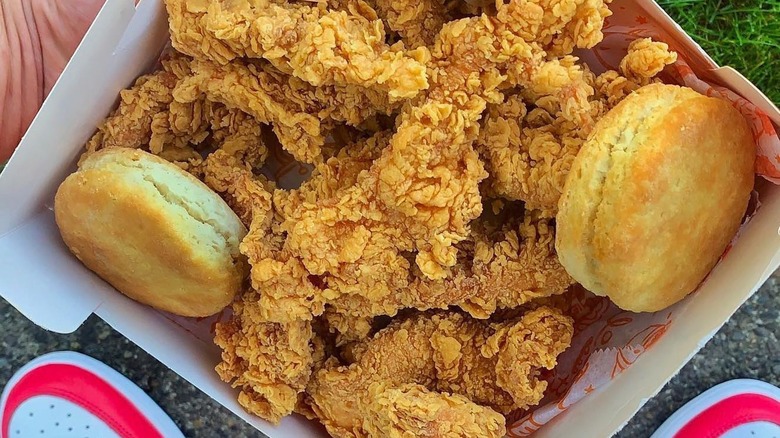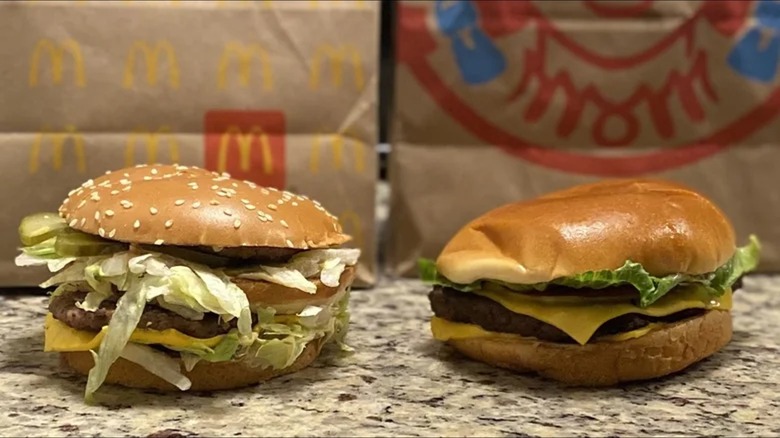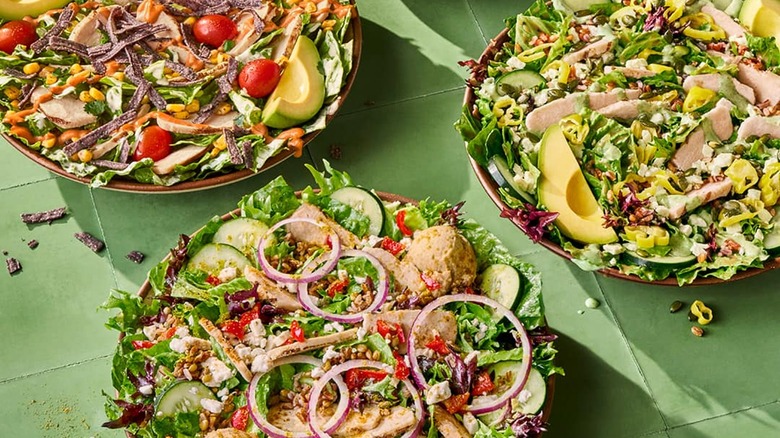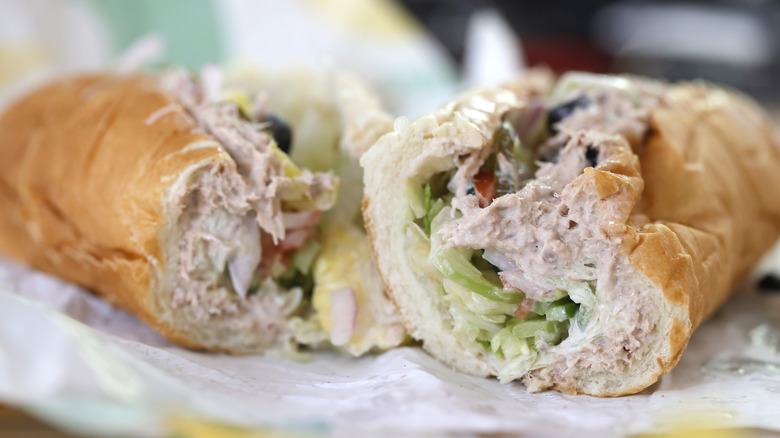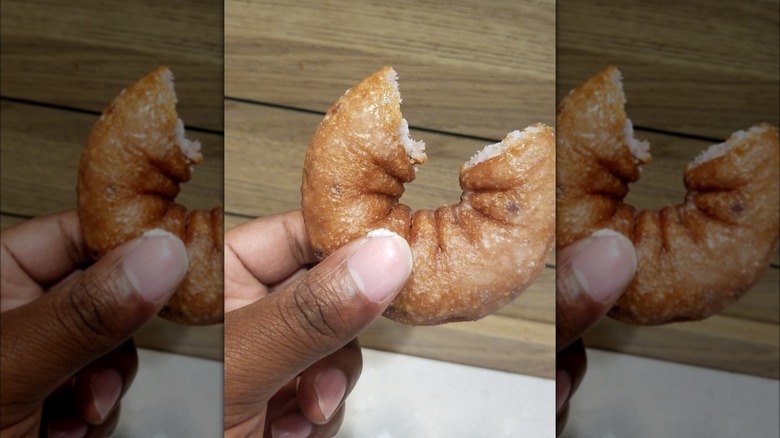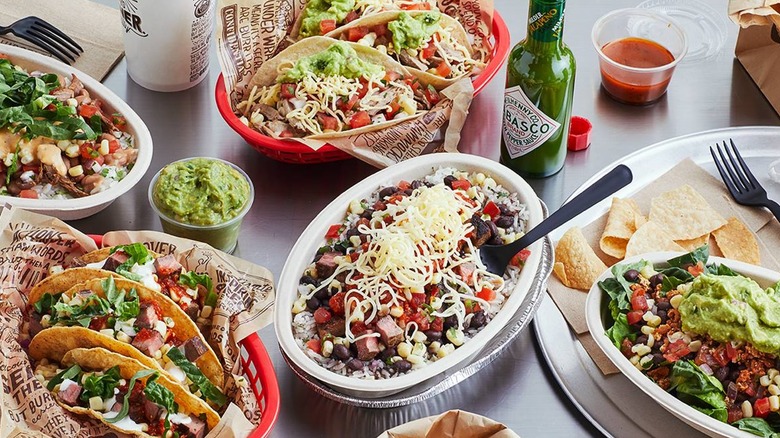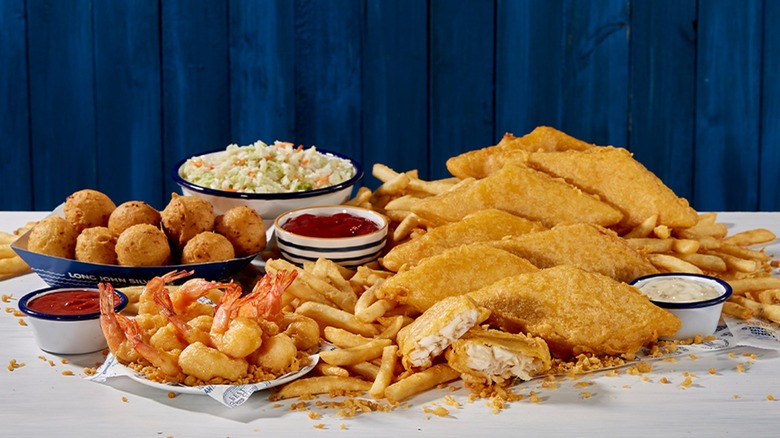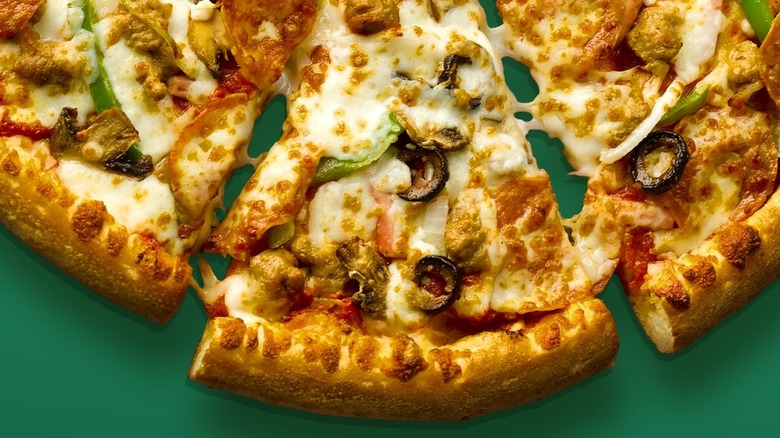Fast Food Chains That Have Been Sued For False Advertising
Fast food chains tend to be lawsuit targets, especially when it comes to being sued for false advertising. Sure, it's worth noting that some of the lawsuits have been dismissed and the fast food chain in question is legally in the clear. For example, some plaintiffs don't even research the definition of the products they thought they were getting before suing about them. One lawsuit we found came from a person who had never even personally bought the product. However, others have resulted in monetary payouts to plaintiffs or customers and dents in the chain's reputation. Sometimes, these suits mean the restaurants are required to make changes or enact other forms of compensation.
There have been some more serious allegations levied against fast food restaurants, too, including claims that some have purchased ingredients from companies that are violating human rights and others that may have even put customers in danger. These wide range of false advertising claims require different approaches from judges and have led to some eye-catching lawsuits.
Starbucks was accused of not ethically sourcing its coffee as advertised
In January 2024, the National Consumers League (NCL) filed a lawsuit against Starbucks for false advertising relating to its core product: coffee. While Starbucks claims to use ethically-sourced coffee and tea in its drinks, the lawsuit counters that the company actually gets its products from operations that violate human rights via labor practices.
Starbucks uses an internal verification program for ethical sourcing that it calls the Coffee and Farmer Equity (CAFE) Practices. CAFE is supposed to ensure that Starbucks gets its products from sustainable sources that protect laborers. However, the NCL uncovered unsavory reports about some of the farms and co-ops where Starbucks gets its coffee and tea. These allegedly documented child labor; forced labor; sexual, physical, and psychological abuse; and unsafe and inhumane work environments and practices on farms in Brazil, Kenya, and Guatemala.
A Starbucks spokesperson stated that "We take allegations like these extremely seriously and are actively engaged with farms to ensure they adhere to our standards. Each supply chain is required to undergo reverification regularly and we remain committed to working with our business partners to meet the expectations detailed in our Global Human Rights Statement" (via The Hill). However, critics like the NCL have noted that the CAFE Practices don't make it easy for third-party verification of its standards. Now, it's up to a judge to decide whether Starbucks is culpable, though the case is ongoing as of this writing.
Panda Express was accused of misrepresenting delivery costs
Some Panda Express customers were in for a surprise when it came to some of its extra delivery charges when, in 2023, they learned that they might be eligible for compensation in a class action lawsuit.
It all came down to issues with delivery. Customers who ordered delivery through the Panda Express website or app may have thought they were only paying the average $2.95 delivery fee that the chain advertised. However, there was an additional 10% service charge added to many bills that customers weren't necessarily expecting. For instance, a $30 order could go from $32.95 to $35.95. Naturally, the more you ordered, the more you had to pay for delivery.
Panda Express didn't officially apologize or admit to misleading anyone, but it did settle the lawsuit for $1.4 million. As part of this settlement, for a limited time, anyone who used the Panda Express website or app to make a delivery order between July 17, 2020 and February 16, 2022 could submit an online claim form. This process would then compensate them with either cash or a free meal voucher.
Burger King faced a lawsuit claiming its burgers weren't as meaty as advertised
In March of 2022, a class action lawsuit was brought against Burger King , with plaintiffs claiming the chain had presented ads they found misleading. According to the lawsuit the images in the ads gave the illusion that the sandwiches were 35% larger than ones actually received by customers.
While Burger King argued that customers know that advertisements use stylistic visuals, it still claimed that the burgers in its ads are the same as the ones it serves. Burger King also claimed that it doesn't hide the fact that the size listed for its burgers is its starting size — meaning, that's the size before it's cooked and begins to lose mass from released fats and juices.
In 2023, Burger King tried to get a federal judge in Florida to dismiss the case, but the judge wasn't willing to dismiss the whole thing. He decided to make a distinction between television advertisements that showed products without giving a name or price versus sandwiches on menu boards, which presented specific products with specific prices. The part of the case that hasn't been dismissed, at least so far, relates to the products depicted on menu boards. The plaintiff has had a chance to offer more details to demonstrate whether the images are normal advertising exaggerations or a true misrepresentation of the product. As of summer 2025, the court docket shows no final decision from the judge just yet.
Panera was sued for misrepresenting how much caffeine was in its Charged Lemonades
Currently, several lawsuits are pending against Panera Bread related to unclear representation of how much caffeine was in its Charged Lemonades. The company advertised the lemonade as having the caffeine equivalent of a dark-roast coffee ... which wasn't strictly true, as certain sizes of the lemonade reportedly contained more caffeine than the chain's largest dark roast coffee. These shady menu practices allegedly resulted in deaths and significant heart-related medical events for customers.
One lawsuit states a healthy athlete visited the emergency room with heart palpitations and atrial fibrillation after drinking two and a half Charged Lemonades in April 2023. Per the suit, a large 30-ounce Charged Lemonade had 390 milligrams of caffeine, so drinking two and a half was roughly equivalent to drinking 5.75 cups of coffee. Two other lawsuits are related to Charged Lemonade deaths. Both customers had medical conditions that limited how much caffeine they should ingest and didn't realize the lemonade had a relatively high amount. One, a young college student, died in September 2022; and the other concerned a man with an intellectual disability who died in October 2023. A fourth lawsuit came from a healthy teen who suffered cardiac arrest in 2024 , reportedly after consuming just one large Charged Lemonade.
Panera has been unsuccessful in getting the lawsuits dismissed. In 2024, several months after multiple lawsuits were filed and while many remained in progress, Panera retired its Charged Lemonades. Later, in October 2024, the family of the deceased college student settled their suit with Panera before it went to trial.
Taco Bell was accused of not using as much filling as advertised
When Frank Siragusa got a $5.49 Mexican Pizza from Taco Bell, he was disappointed with just how little beef and beans he found inside. Since the filling amount was about half of what was advertised online and on store menus, he sued in July 2023. When Mashed investigated how close Taco Bell's Mexican Pizzas were to its advertisements in August 2023, we didn't get very much meat or beans either, even though it was the most expensive item on the menu.
Siragusa's lawsuit not only cited his own lackluster pizza but brought in images from other disappointed customers posting on social media, who complained about getting very little filling in both the chain's Mexican Pizzas and its Crunchwraps. The lawsuit pointed out that selling products with less filling than advertised can be especially devastating to those with a limited food budget as food costs continue to rise.
If the lawsuit had succeeded, Taco Bell would have had to pay out at least $5 million to customers who purchased poorly-filled Mexican Pizzas or Crunchwraps during a specified time period. However, court docket information shows that the case was voluntarily dismissed and terminated on November 13, 2023.
Popeyes was sued for not making chicken tenders out of tenderloins
In July 2022, Natasha Sanders filed a lawsuit in New York claiming that Popeyes had falsely represented its chicken tenders given that they were made from chicken breast meat rather than tenderloins. Operating under the assumption that tenderloins were the superior cut of chicken, Sanders felt that the Popeyes menu was shady and that she was getting ripped off by paying a premium price for everyday meat.
In Sanders' lawsuit, she claimed that customers wouldn't pay as much for strips of chicken made out of regular breast meat as they would for strips that came from the tenderloin. While the USDA does specify that tenderloins are the pieces of meat that run next to the breast bones in chicken, it also determines that chicken tenders can be "any strip of breast meat," not just tenderloin. According to the court docket, the lawsuit was voluntarily dismissed in 2022.
Undeterred by the lawsuit, Popeyes continues to advertise its chicken strips as chicken tenders. It also doesn't specify exactly what type of white meat is in its tenders because it technically doesn't have to, based on current USDA guidelines.
McDonald's and Wendy's were sued for exaggerating burger sizes
In 2022, a customer filed a lawsuit accusing McDonald's and Wendy's, alleging that the advertised size of the chains' burgers was inflated compared to the real things. The lawsuit claimed that the hamburgers in the restaurants' ads must be undercooked, since fully-cooked hamburgers shrink by about 25% during the cooking process. The lawsuit further claimed that ads put out by both chains were misleading and harmful to customers.
In 2023, a U.S. district judge ruled in favor of both McDonald's and Wendy's, reasoning that the advertisements McDonald's and Wendy's used were similar to those of other fast food restaurants. Plus, the judge noted that there were plenty of well-displayed disclaimers available on the restaurants' websites that gave enough information for a customer to understand what they were getting. Since the weight and calorie content of the burgers were clearly stated and available to the consumer, the judge didn't believe that there was any deception on the part of the restaurants.
A lawsuit claimed Panera Bread misrepresented claims of clean ingredients
Randall Sally filed a lawsuit against Panera Bread in August 2020, accusing the chain of using ingredients that weren't 100% clean as it had claimed. Because Panera's stated food beliefs included serving so-called clean foods (which it defines as foods free of artificial preservatives, sweeteners, flavor, and colorants), it created a "No No List" of ingredients in 2015 that features many artificial ingredients the chain says that it doesn't include in its products.
Sally's lawsuit claims that Panera still serves unclean ingredients, giving examples like ascorbic acid (vitamin C), citric acid (a natural acid found in citrus), potassium sorbate (a food preservative), and tocopherols (many of which include vitamin E). Part of its claim is based on the FDA definition of chemical preservatives, which only gives exceptions to "common salt, sugars, vinegars, spices or oils extracted from spices, substances added to food by direct exposure thereof to wood smoke, or chemicals applied for their insecticidal or herbicidal properties."
Sally originally filed the lawsuit in a Missouri court. Panera tried to move the case to a higher court, but a district judge kicked it back to Missouri in 2021. In October 2022, the court docket showed that the whole case was dismissed. In the meantime, Panera hasn't added any of the questioned substances to its No No List and apparently continues to use them.
Subway was accused of using tuna that wasn't 100% real
In 2020, Karen Dhanowa and Nilima Amin filed a federal class action lawsuit accusing Subway of using fake tuna in its tuna salad. They didn't have an answer for what the mystery meat was supposed to be, but they didn't believe that it was tuna.
In response to the lawsuit, several news sources did their own investigations. The New York Times sent samples of tuna salad from three restaurants in Queens to a lab to check for tuna DNA. The lab couldn't find any tuna DNA, concluding that it either wasn't made with tuna or was too processed to identify. However, reporters at Inside Edition who sent tuna sandwiches to a Florida lab (which specializes in identifying fish DNA) got different results. In their investigation, samples from three different sandwiches collected at three different locations in Queens, New York all contained tuna DNA.
There were three total versions of the Subway tuna lawsuit. The first was dismissed on a technicality, while the second was dismissed because one of the plaintiffs had never actually bought a Subway tuna sandwich. One of the plaintiffs dropped the third and final version of the lawsuit because she had extreme morning sickness. Subway fired back, demanding hundreds of thousands of dollars to recover its attorney fees, but the judge didn't grant the chain's request.
Dunkin' has been sued multiple times regarding ingredients
Various customers have encountered purportedly shady ingredients on the Dunkin' menu. Thus, the chain was sued multiple times in 2017 for misleading its customers.
Yet two of the 2017 lawsuits were dismissed. A New York customer complained about the chain's Angus Steak and Egg Breakfast Sandwich, saying that it contained ground beef instead of real steak. In 2020, the court concluded that the advertisement wasn't misleading and the case was dismissed. After all, the dictionary definition of steak also typically includes hamburger steaks. In another 2017 lawsuit, Dunkin' was sued over not having real blueberries in its blueberry donuts. It turned out that customers were chomping down on blueberry-flavored crystals instead of real fruit. The lawsuit included multiple blueberry donut flavors served up by the chain, including Glazed Blueberry, Blueberry Butternut, and Blueberry Crumb Cake. Blueberries weren't on the ingredient list for any of these donuts. Ultimately, the customer who brought the case voluntarily dismissed the blueberry lawsuit. A similar suit brought by a California plaintiff made much the same blueberry-related claims, but appears to have gone nowhere.
Dunkin' did lose one of its 2017 lawsuits, in which a customer was upset about not getting butter on their buttered bagels. It turned out that employees at the location were adding more easily-spreadable margarine instead of butter. After a 2019 settlement, the franchise owners also vowed to change their buttering practices.
Chipotle was sued for misleading customers about non-GMO ingredients
After Chipotle ran ads that indicated its ingredients came from non-genetically modified organisms (non-GMO), customers naturally had certain expectations. However, some customers who dug deeper into the background of the foods Chipotle was serving felt misled and sued the restaurant.
There were two main complaints in the lawsuit, initially filed by six plaintiffs in April 2016. One was that the animals that Chipotle was using for its meat were fed with GMO foods. The other was that the chain served soft drinks made with GMO corn syrup. The plaintiffs argued that the non-GMO claims that Chipotle were making were therefore bogus.
A judge initially dismissed the case in 2016 but changed his mind in 2018. But, before the case could go back to trial in 2019, Chipotle agreed to a settlement of $6.5 million, which would refund $2 per meal to U.S. residents who ate at Chipotle between April 27, 2015 and June 30, 2016. Households could get a refund for up to 15 meals with proof of purchase or up to five meals without proof. The attorneys and plaintiffs received more significant portions of the payout, and Chipotle also agreed to donate $475,000 to a variety of major charities.
Long John Silver's sued Captain D's for misleading advertising
Long John Silver's sued rival seafood chain Captain D's in October 2009 after an odd and possibly misleading advertising campaign started appearing in newspapers. Either the advertising campaign was a complete mistake or it represented new height in vicious chain rivalry. However, it was up to a judge to decide.
That year, Captain D's in Knoxville, Tennessee, started running newspaper ads saying that, since Long John Silver's had closed, it would honor any of the competition's coupons customers still had laying around. The clencher: none of the Knoxville Long John Silver's locations had actually closed. A Long John Silver's franchisee sued.
A spokesperson for Sagittarius Restaurants, the parent company of Captain D's, claimed that running the ad in Knoxville was supposedly an accident and it was supposed to be "for publication only in the community in which the closed restaurant was located" (via Nation's Restaurant News). However, the whole point of the lawsuit was that Long John Silver's wasn't convinced that it was an accident and assumed that the ad was meant to be misleading. A search of court dockets didn't reveal how the suit finally ended, though a lack of information about settlements or decisions hints that it may have been dismissed.
Pizza Hut tried to take Papa Johns to the Supreme Court
In 1998, Pizza Hut sued Papa Johns over an ad campaign, specifically the chain's use of the slogan "Better Ingredients, Better Pizza." Pizza Hut felt that the statement wasn't true and could hurt its business, hence the lawsuit.
The case scrutinized the way that each pizza restaurant made its sauce, dough, ingredients, as well as the results of taste tests and the content of each chain's commercials. Both sides ultimately sought monetary restitution for "corrective advertising" that both chains did in response to the other's advertising.
Papa Johns lost its first jury case, but, unhappy with the outcome of having to stop the campaign, it appealed the decision. Three appeals judges ruled in 2000 that the statements that Papa Johns made in its advertisements were not false or misleading, but just exaggerated advertising. Pizza Hut wanted to take the case to the Supreme Court court. However, in 2001, the Supreme Court didn't find the case worth its time and refused to consider it.
